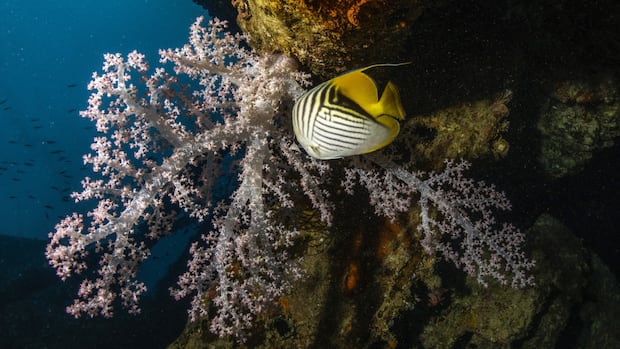As It HappensCan fish feel pleasure? Scientists say yes, and they might even crave it
If you’re asked to picture a creature having the time of its life, a fish probably isn’t the first animal that comes to mind.
But new research is challenging that perception, suggesting that some fish not only seek out pleasurable experiences but may even remember and crave them.
“Most people think of fish as almost like an inferior vertebrate,” Marta Soares, a behavioural physiologist at the University of Porto in Portugal told As It Happens host Nil Köksal.
Historically, Soares says, research on fish has been preoccupied with the negative — how stressed they get, and how much.
In a study published earlier this month in Proceedings of the Royal Society B, Soares and her team took a different approach that’s rarely explored in aquatic animals.
They wanted to know: can fish feel good? Do they experience something akin to pleasure?
The results, said Soares, are a step towards considering fish to be closer to other, “normal” vertebrates like cats and dogs.
What did they find?
Soares studies mutualisms, or interactions between species that benefit both parties.
In coral reefs, she says, one of the most fascinating examples is between the bluestreak cleaner wrasse, a sleek silver fish with a bold black stripe, and the threadfin butterflyfish, a yellow-and-white species with striking black markings.
The cleaner wrasse feeds on parasites found on the butterflyfish’s skin, while the butterflyfish gets a free grooming session. These meetings happen at a designated “cleaning station,” territories where fish line up for a quick spruce-up.
But Soares and her team suspected there might be more to these interactions than just hygiene.
She had previously shown that during cleanings, cortisol levels — a key stress hormone — dropped in reef fish. That led to a new question: could these cleanings actually feel good?
Researchers designed a series of lab experiments using butterflyfish that were parasite-free, which removed the health incentive from the equation.
They noticed that butterflyfish preferred to hang out in the part of the tank where they had previously interacted with a cleaner wrasse.
“It would work like a happy memory,” said Soares.
Fish, like humans, have an opioid system in their brains which regulates pain and pleasure. The scientists wanted to know if this system played a role in the fish’s preference for cleaning.
They injected the butterflyfish with a low dose of an opioid mimic, a morphine-like drug that stimulates pleasure receptors. The fish’s attraction to the cleaning area increased, says Soares.
Then, they administered naloxone, a drug that blocks opioid receptors — the same one used to reverse overdoses in humans. This time, Soares says, the butterflyfish showed no interest in the cleaning zone.
Finally, the team wanted to explore a subtle but important distinction: is there a difference between liking the cleaning and wanting it?
To find out, they “put little doors and obstacles” in the tank, forcing the butterflyfish to navigate around barriers to reach the cleaners. Whether the fish received the opioid mimic or the blocker made no difference; they still swam through the barriers to get their grooming.
“They would be interested in circumventing those obstacles to get to the cleaner,” said Soares.
Fish have feelings
Since the study’s publication, some scientists have questioned whether the findings are indeed evidence of fish experiencing pleasure.
“Can we unequivocally say that this is pleasure in fish? I’m not sure that I would say it in those words. Having said that, it’s very difficult to measure pleasure in animals, period, let alone fish,” Susana Peciña, a biopsychologist at the University of Michigan-Dearborn who wasn’t involved in the study, told NPR.
Soares isn’t surprised by the caution. She says human observers can more readily ascribe emotions like pleasure to mammals, like dogs or primates.
Still, she’s encouraged by their findings that fish change their behaviour in response to positive experiences.
“It’s a cool study of a fascinating natural system,” McGill University associate biology professor Simon Reader told CBC in an email. “I think the results fit well with changing ideas about how fish behaviour is more flexible and complex than once thought.”
This kind of evidence, says Soares, could influence how fish are treated in aquaculture and aquariums.
It’s about “changing the way people look at fish,” she said.







